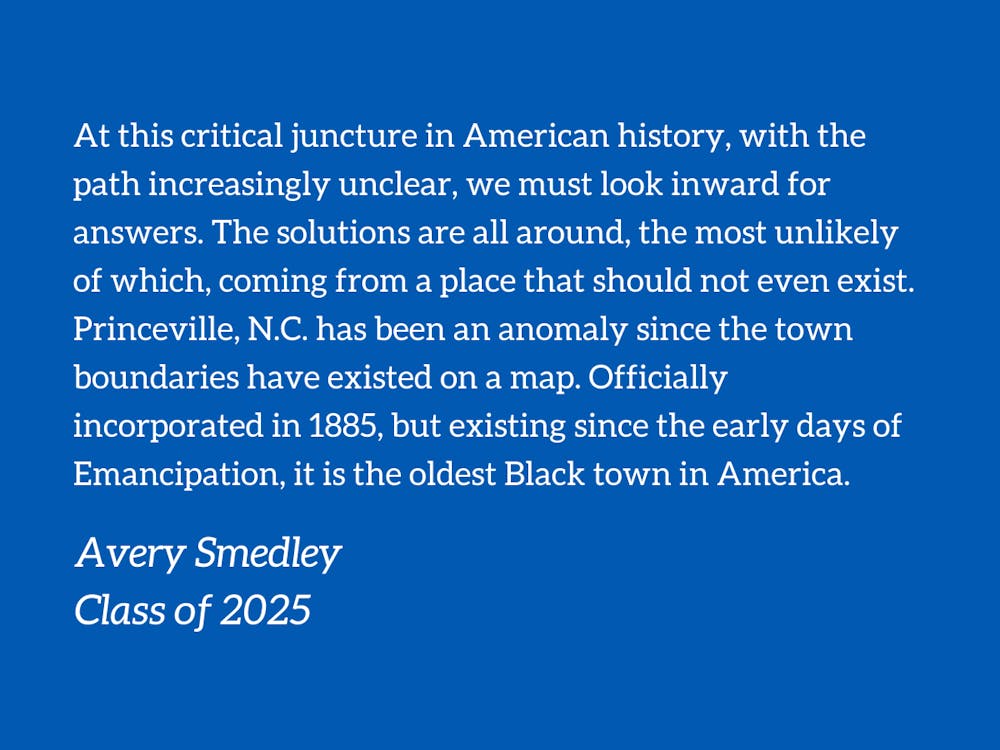Democracy in America is becoming a lost art. One-third of American adults still doubt President Joe Biden’s legitimate election. Americans are increasingly losing trust in elections, elected officials and so many other features of American civic life. This leaves us with two paths forward: Either the public’s trust will be regained, or the nation will become ever-more fragmented by anxiety, fear and paranoia. At this critical juncture in American history, with the path increasingly unclear, we must look inward for answers. The solutions are all around, the most unlikely of which, coming from a place that should not even exist.
Princeville, N.C. has been an anomaly since the town boundaries have existed on a map. Officially incorporated in 1885, but existing since the early days of Emancipation, it is the oldest Black town in America.
Princeville has persisted through centuries of annexation and buy-out attempts, through consistent flooding and rebuilding, all amidst a backdrop of neglect and ambivalence from state and federal actors. Yet, Princeville still stands. Most of the town’s residents are the descendants of freed people who settled there long ago, including the mayor and commissioners. Co-raciality, a phenomenon in which elected officials share the same racial background as their constituents, is already uncommon, making this place that exists against all odds all the more exceptional. This is only becoming rarer and rarer as Black-autonomous towns like Princeville rapidly disappear.
I investigated this phenomenon in my senior honors thesis, the results of which suggest that representation could matter more than we think. Black autonomous towns could make a marked difference in how civilians interact with local civic life.
My case study of Princeville and a comparable segregated town suggests that Princevillians may be more engaged in and knowledgeable about local politics, as well as more trusting of their elected officials. As one resident put it, it makes a difference that the politicians are “people who look like me, who went through the same things ... as me.” Participants voted more often and found their politicians to be more approachable. In Princeville, it’s not uncommon to run into the mayor at the grocery store or to have grown up with one of the town commissioners.
Princevillians share a deep pride in their collective history —and this means something to residents. Every conversation I had with a resident was marked by rich family histories going back generations.
As strong as Princeville’s history is in motivating its citizens to vote, a diametric history in the segregated town across the bridge has the opposite effect. There, in Tarboro, the memory of Black Codes, Jim Crow and white supremacy is still visceral, constraining Black citizens’ political expression. A majority of residents noted apprehension around the tacit social hierarchy still in place, still dictated by race and class. In the rural South and beyond, this memory is alive and well.
Princeville has stood as a rare symbol of resilience and freedom in a nation fraught with this potent and omnipresent legacy. It also stands as a rare model of co-racial representation and what close relationships between elected officials and their constituents could look like. Perhaps, in this regard, it even stands as a model for the rest of the country.
While my data suggests that co-racial political representation may be linked to increases in civic engagement, political knowledge, trust in elected officials and belief in government responsiveness, this does not mean autonomous Black towns are perfect in their political landscapes. Tarboro and Princeville shared many of the same challenges in low voter turnout, lack of civic education and slow bureaucratic processes. Although imperfect, Princeville gets a lot of things right around representation and relationship building. The town’s existence lends itself to valuable insights around rebuilding trust and involvement in American civic life.
Local governments like Princeville serve as exciting laboratories for reigniting civic engagement in a landscape of increasing nationwide democratic decline. As it stands, citizens do not interact with democratic decision-making often. American citizens vote less than citizens in other established democracies. When they do, it's primarily at the national level, which requires engagement once every four years or so and produces impacts that do not always feel connected to citizens’ day-to-day lives.
A true commitment to rebuilding democracy recognizes local institutions as its building blocks. It is in local schools and town halls that citizens will most directly feel the effects of policy or their petitions for change. It is these experiences that grow civic skills and the impetus to continue to engage with politics on other levels. A true commitment to democracy looks like following in Princeville’s footsteps, such as increasing the number of co-racial candidates in office and making public servants more accessible to their constituents.
For far too long, Princeville has been removed from history books and kept out of national conversations, lest it be to pity the town’s frequent flooding, which cannot be decontextualized as anything other than environmental racism. Centuries of negative attitudes toward Princeville have only been a disservice to the town and frankly, this nation. As our leaders begin picking up the pieces of our deeply fissured civic life, they would be remiss to ignore the answers playing out less than 300 miles from the nation’s capital in places like Princeville, N.C. Proper recognition and approbation are long overdue. Princeville deserves better. America deserves better, too.
Avery Smedley is a Trinity senior.
Get The Chronicle straight to your inbox
Sign up for our weekly newsletter. Cancel at any time.

